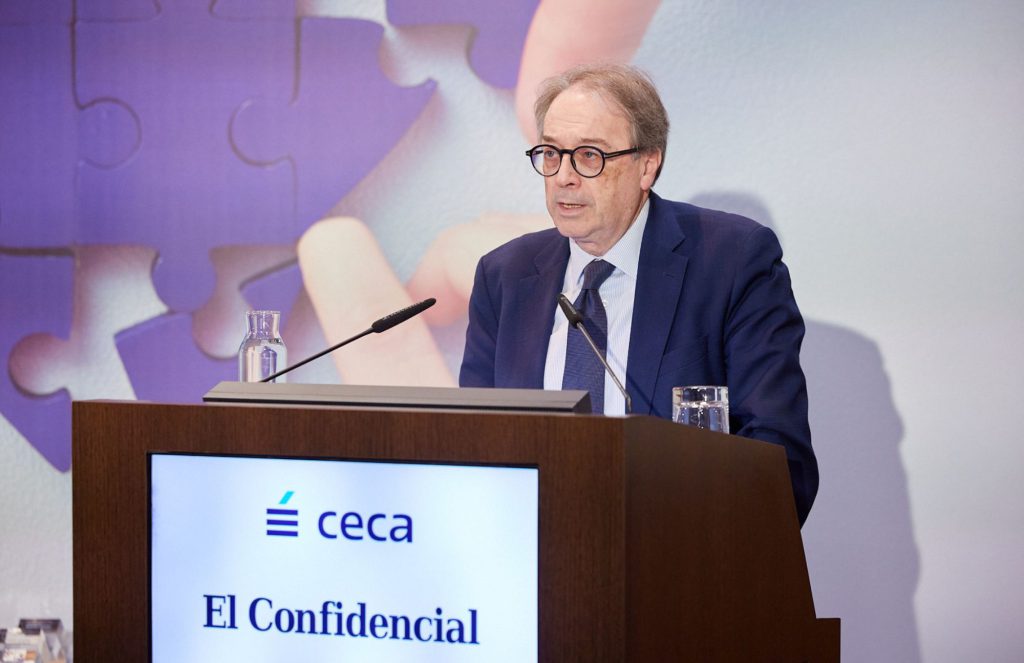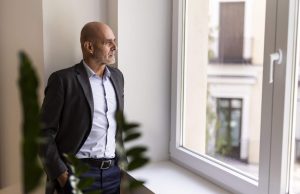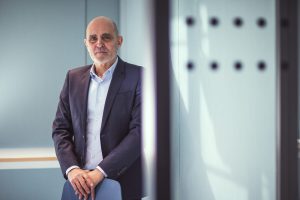Each year, the awards recognise the best social and financial education projects, this time with a new international category and a new leading role: the transformative power of tools at the service of society
There is a well-known Chinese proverb that says "give a person a fish and they will eat today; give them a rod, teach them to fish and they will eat the rest of their lives". The message is clear: direct assistance generates dependency and is short-sighted, whereas providing tools is useful for empowering those in need so that they can overcome their complex situation permanently. This was precisely the message conveyed by the winners, finalists and participants in the latest edition of the CECA Obra Social and Financial Education Awards, the award ceremony for which was held this past Tuesday at the organisation's head office in Madrid, organised, as in previous years, jointly by CECA and El Confidencial.
The ceremony was hosted by Juan Carlos López, Head of Sustainability and Stakeholder Relations at CECA, and Elena Hita, a contributor to this media outlet, and featured Carlos Sánchez, Deputy Director of El Confidencial, and Antonio Romero, Corporate Director of Association Services and Resources at CECA. In addition to the award winners and their representatives, the gala brought together the members of the jury, made up of experts from the Ministry of Economic Affairs and Digital Transformation, the Bank of Spain, the National Securities Market Commission, Fundación Lealtad, Spainsif, Complutense University of Madrid, Instituto de Salud Carlos III, Funcas and El Confidencial, who had to evaluate a total of 71 nominations.
As in previous years, the awards were divided into two main categories: Obra Social and Financial Education, although the main novelty of this edition was the inclusion of an honorary award with the aim of recognising Social Initiative and International Trajectory. This new award went to Fundación Grupo Social, a Colombian organisation with 112 years of history. Its Chairman, Juan Carlos Gómez Villegas, who was following the event via streaming, explained to the audience that the organisation "works with a promotional approach, not a welfare approach, because we want to empower people so that they become the administrators of their own development".
In addition, Gómez Villegas pointed out that Fundación Grupo Social possesses a special characteristic: it owns several companies and not the other way around, as is usually the case. This implies that these companies "focus on contributing to overcoming the structural causes of poverty". In parallel, he clarified that one of these firms "is Banco Caja Social, a prominent bank in Colombia that is oriented towards the base of the pyramid, that is, it seeks to help people with lower incomes, as well as smaller companies".
The social commitment of entities
In the Obra Social category, the special jury award went to the Family needs Family campaign, from Fundación la Caixa, designed for people who arrive in our country in a situation of forced displacement, as is the case of Ukrainian families. "This project was commissioned directly by the central government and would not have been possible without the collaboration and help of the 18 entities that worked with us in the four selected cities", said Marc Simón, the organisation's deputy director general. "Thanks to them, we were able to get more than 4,500 families to offer themselves, of which we validated almost 600 and, in the end, 300 families were able to take in Ukrainian families", he said.
The other categories of Obra Social recognised Unforgettable, from Fundación Caja Navarra (Social Action); Caixaforum+, from Fundación la Caixa (Culture and Heritage); Fundación Unicaja Campus (Sport and Leisure); Skylab, from Fundación Ávila (Local Development and Job Creation); Scellentia, from Fundación Caja Extremadura (Education and Research), and Plancton, from Afundación, Obra Social Abanca (Environment). The finalists in these sections were, respectively, Ibercaja Pintura Joven Award, from Fundación Ibercaja; Deportivity programme, from Fundación Vital Fundazioa; Gastro-employment, from Fundación La Caja de Canarias; Guidelines for the promotion of mental health and prevention of teenage suicide, from Fundación Vital Fundazioa, and Cultivate Friendship, from Fundación Montemadrid.
A tool for life
The special jury award in the Financial Education category was awarded to Fundación Ibercaja for its project Learning to be an Entrepreneur. The award was collected by Mayte Santos, the organisation's Head of Business Development and Education, who highlighted the aim of the programme: "We want to contribute to the progress of society and achieve social equality through financial education, because it enables people to make better decisions". She also pointed out that, "despite having organised 13 editions of the programme, the last one was a great success because 2,500 students from 49 schools took part".
Her colleague Carmen Campos, coordinator of Education Projects at Fundación Ibercaja, put the spotlight on the fact that "what students learn in the programme will help them for the rest of their lives, when they have to make important decisions such as buying a house, taking out a mortgage, investing the money they have saved or retiring".
The winners in the other sections of the category were the ImaginAcademy projects, from CaixaBank (children and young people 0-25 years of age); Much to do, from CaixaBank (adults 26-65 years of age); Financial and digital education workshops for the elderly, from Unicaja Banco and Fundación Bancaria Unicaja (65+ years of age), and the Rural Entrepreneurship Awards, from Fundación Ibercaja (Entrepreneurs). The respective finalists in the same categories were Escape Room, Savings, from Fundación Cajasol; Financial Mondays, from Fundación Cajasol; Rural financial training and digitalisation programme, from Afundación Obra Social Abanca, and SamaraCamp, from Fundación Caja Extremadura.
The new form of empowering society
The members of the jury were unanimous in praising "the quality of the projects submitted". Thus, Carlos Sánchez, Deputy Director of El Confidencial, stressed that "a country is worth what its institutions and civil society are worth", but noted that "the latter must be organised through foundations so that the work is professional and efficient, and can reach all citizens". For her part, Marta Alonso, Head of the Technical Secretariat of Spainsif, praised the high standard of the participants: "We had a very difficult time selecting the winners, there was a lot of debate. But the main thing is to highlight the work that the foundations have done with all groups, ranging from children to the elderly, with special emphasis on financial education, as we believe it is very important in this day and age".
Antonio Romero, Corporate Director of Association Services and Resources at CECA, was responsible for closing the event, stating that "this awards ceremony is no more and no less than recognition of our particular way of understanding the banking business. In other words, our institutions provide financial services, that is clear, but they have always understood that those same services must be tied to a commitment to the development and welfare of the communities where we are rooted".
CECA's representative also praised the fact that "Obra Social is in very good health at the moment. Proof of this is that last year our entities invested more than €800 million in assistance. Investment strongly focused on people in vulnerable situations or with special needs who have been, to a large extent, beneficiaries of these social initiatives". At the same time, "organisations have shown themselves to be committed to financial education as a new way of empowering today's society in the face of the complexity of the financial sector", he concluded.













